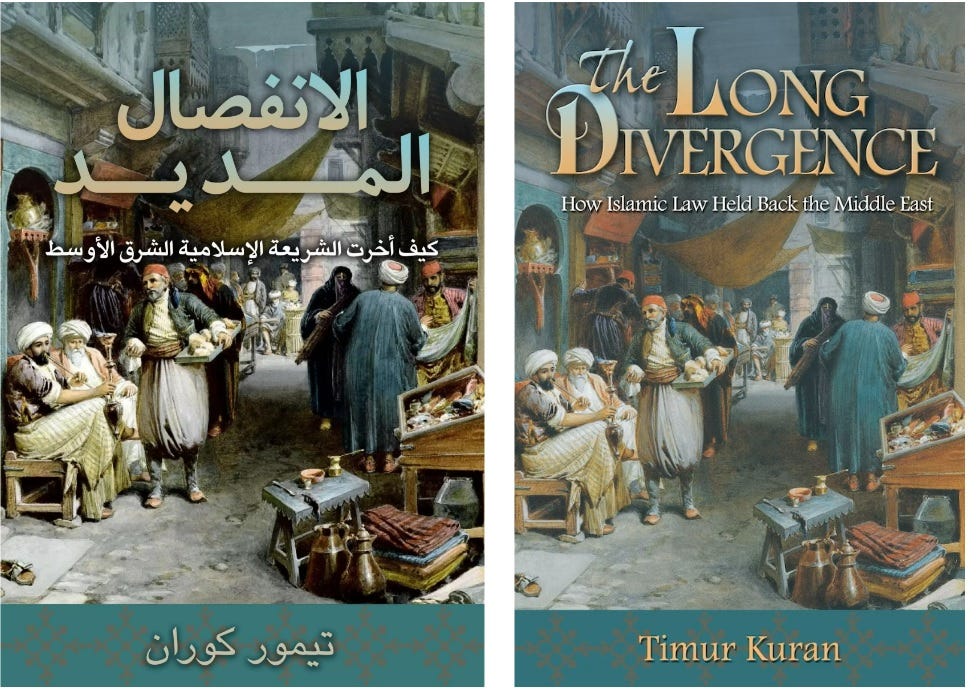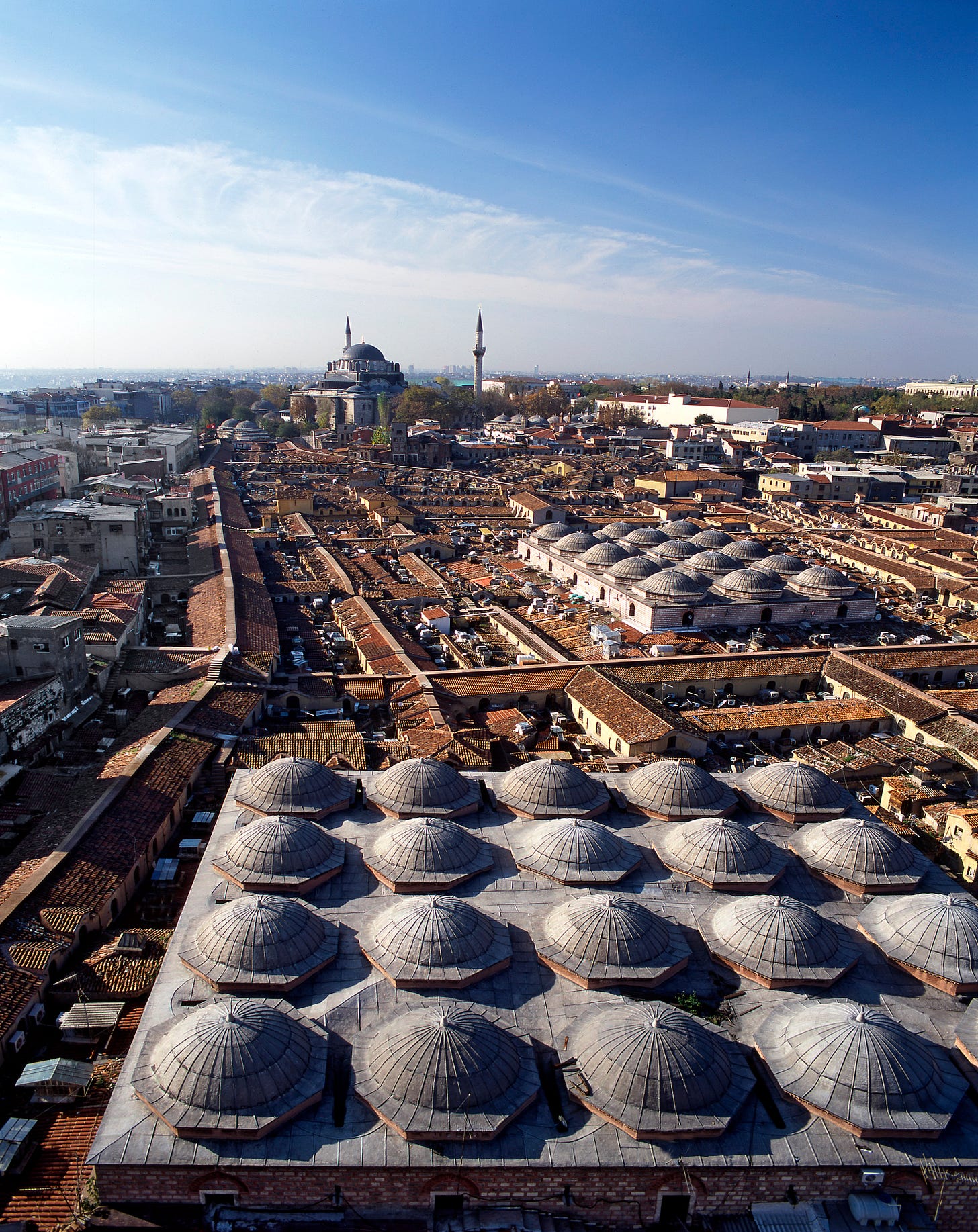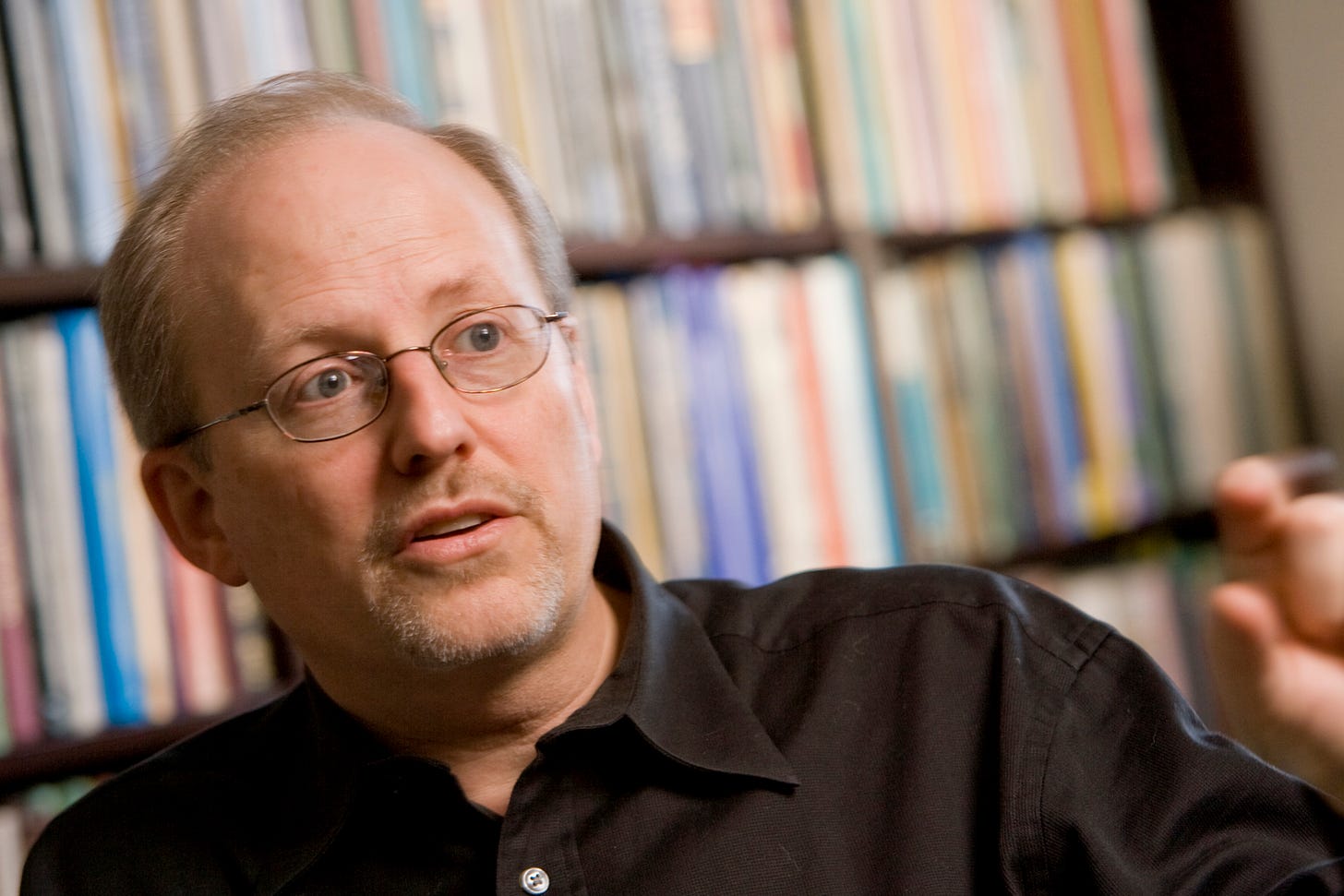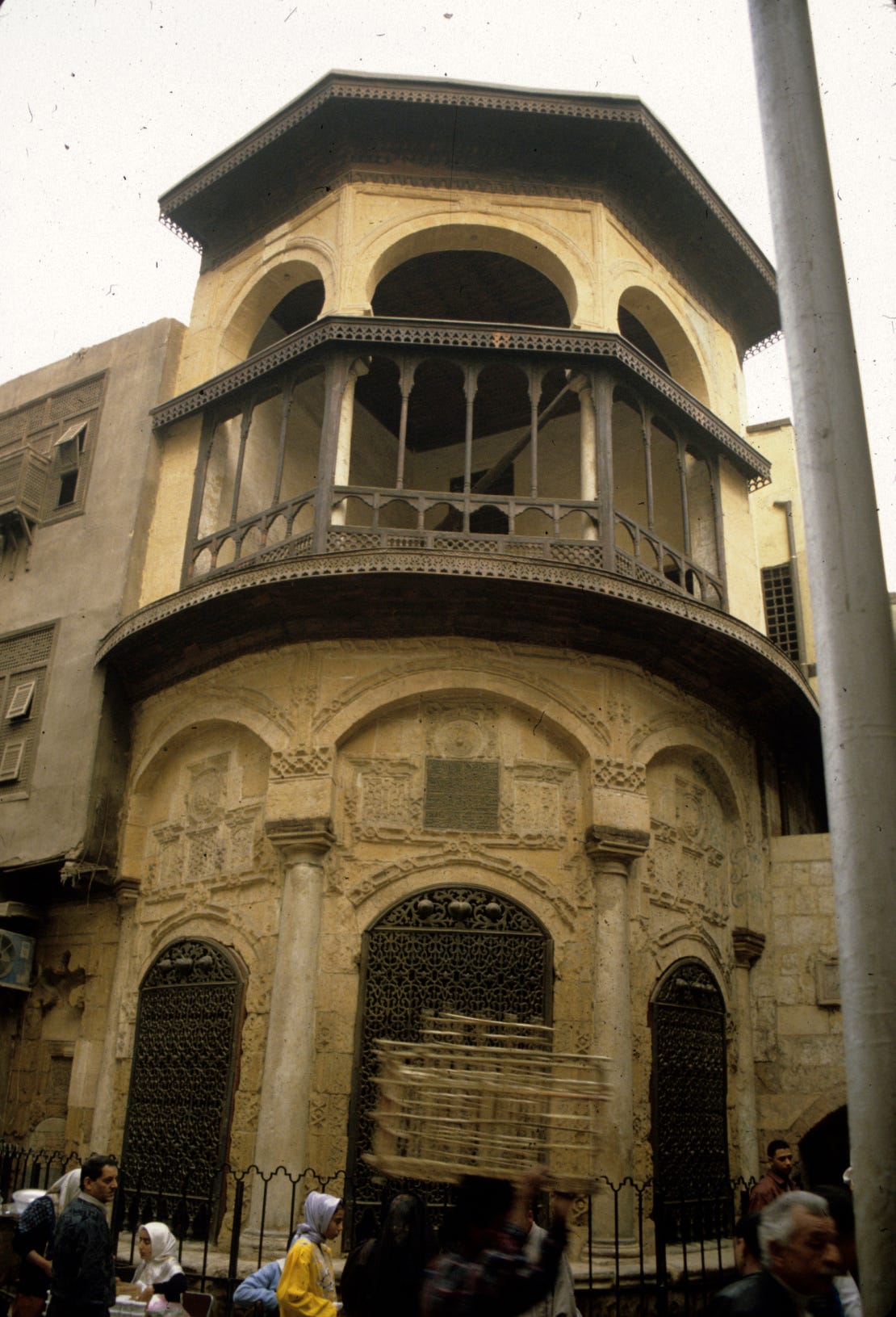Dr. Timur Kuran on The Long Divergence
An IBB interview on why development in the Middle East fell behind, and how it can surge ahead once again.
Dr. Kuran is a world-renowned Turkish-American scholar of economics, political science, and history. Our translation team recently published his book, the Long Divergence, into Arabic and is at work disseminating it across the Middle East. The book examines the causes and implications behind the economic divergence between the West and the Middle East, a crucial topic for our followers across the MENA region who are hard at work closing that gap.
IBB: Why did you write this book?
Dr. Timur Kuran: In the year 1000, if you were asked which region of the world would lead the Industrial Revolution, you would probably answer, China or the Middle East. At that time, it was unimaginable that Europe, an economic backwater, would overtake both economic superpowers of the time. Yet, the Middle East (I’m using this in the sense of MENA) failed to generate the institutions of the modern economy on its own. And, during its existential crisis of the 1800s, it had to transplant the infrastructure of the modern economy from abroad, in a hurry.
Why this reversal of fortune? By the first decade of the 2000s, no coherent theory had addressed the puzzle in depth. There were superficial and easily debunked theories that pin the blame on foreigners, as though the Middle East has lacked agency. One class of theories ascribed responsibility to European colonizers—France, Britain, and eventually the US. Another theory went farther back, to the sacking of Baghdad by the Mongols, as though its shockwaves could bring North Africa and Muslim Spain, too, to their knees. No one had bothered to examine, using modern tools of analysis, whether the traditional institutions of the Middle East had played some role in the reversal. Yes, big literatures existed on key institutions of the premodern Middle East, such as the waqf and the Islamic partnership. But no one had explored how these institutions shaped the Middle East’s economic trajectory. And nothing at all existed in the literature on how these institutions interacted, or on why the West’s institutional innovations were not emulated, or on whether Islam really blocked certain adoptions, as many believed.
The leading books on the economic history of the Middle East, such as those of Charles Issawi and Roger Owen, hardly even mentioned Islamic institutions. They left readers in the dark about the vast importance of the Islamic waqf. And, although they made clear that the Middle East entered the 1800s with economic institutions better suited to the Middle Ages, they provided no insight as to why the necessary institutional changes had not materialized already, through local initiatives. In the centuries leading up to the Industrial Revolution, why had a region that had shown great dynamism failed to meet the new challenges?
In a nutshell, I wrote the Long Divergence to fill a huge void in our knowledge about Middle Eastern history. I wanted to face the puzzles head on, by studying how the region’s traditional economic institutions (all part of Islamic law, known popularly as Sharia law) had affected economic development over time. I felt that the answers would help the region’s peoples to come to terms with why they lived in an underdeveloped part of the world when their ancestors ran economies that were advanced for their time.
IBB: What responses has the Long Divergence received from the Middle East?
Dr. Timur Kuran: The reactions of laypeople have been highly favorable in Turkey, where the book has been available in Turkish. This seems to be the case also in Iran, where a Persian edition has been available. My feedback from Iran has come mostly via the Iranian diaspora, so it may be less representative. In both countries, but also in the Arab world, academics have had access to the English edition.
Reactions from established historians have been mixed; some have dismissed the whole project, probably because the reasoning does not fit their narrative, or because they consider the book’s question to be out of bounds somehow. But most young historians have been very enthusiastic. It appears that the book has opened new windows for them. Also, it has furnished to them new questions to pursue. As for Arabs, most have lacked access to the Long Divergence until now. I’m curious to see the reactions to this translation. It will be interesting to see what discussions it generates.
IBB: What about responses from the West?
Dr. Timur Kuran: Among non-academic Western readers, the reactions have been very positive. Glowing reviews appeared in many publications, including the Economist and the New York Times. Within academia, they have been overwhelmingly positive within economics and political science. Many scholars are trying to build on the book’s insights. Within Middle East Studies and Islamic History, reactions have been mixed. With some exceptions, post-modernist scholars refuse to engage with it. The same is true for scholars who operate in the anti-Orientalist paradigm. They just dismiss the book without reading it. The question is “Euro-centric,” they say, and, hence, unworthy of consideration. The basic problem is that the Long Divergence does not fit the narrative that Britain, France, and the United States are the villains who forced the region to fall behind for their own benefit. Fortunately, area scholars belonging to the rising new generation are much more interested in the book’s question, methodology, and findings.
IBB: Is the long divergence over now, in 2022?
Dr. Timur Kuran: The Middle Eastern economy has undergone vast transformations since the start of modernization in Egypt and the Ottoman Empire in the early 1800s. Many of the institutions that blocked development directly are now gone, and new institutions have taken their place. It is very important to recognize these achievements. Nevertheless, there are enduring problems. Throughout the region, and especially in Arab lands, civil society is weak. Firms tend to be smaller in size than their counterparts elsewhere. The Fortune Global 1000 contains disproportionately very few firms based in the Middle East. This limits the political influence of merchants, financiers, and private investors. The weakness of civil society and the private sector are among the legacies of premodern institutions that have been discarded. It is taking time for the Middle East to complete the transformation that in Western Europe unfolded over a millennium.
A related problem in the region is that interpersonal trust endemically low interpersonal trust, as is trust in institutions. Exchange was strictly interpersonal until at least the mid-1800s and, in some places, until the mid-1900s. People dealt with acquaintances, and enterprises lacked legal personality. Islamic courts gave standing only to flesh-and-bone individuals, never to groups or enterprises. But in a modern economy most exchanges are between people who are mutual strangers, between individuals and firms, and between firms. Impersonal exchange, not personal exchange, is the norm. The efficiency of impersonal exchange depends on trust. In the Middle East, generally low trust impedes impersonal exchange. Much of what we call “corruption” results from personal efforts to turn impersonal exchange (for example, between a taxpayer and the state tax office) into personal exchange (for instance, between a taxpayer and a tax clerk, as an individual rather than an official). In Western Europe the transition to impersonal exchange unfolded over centuries. The Middle East has had less time to adjust. Although the transition is under way, the region remains behind the global average, which is why it shows up poorly in international corruption statistics. So, although there has been convergence in certain respects, the Middle East remains relatively underdeveloped.
IBB: How could IBB help bridge the gap specifically?
Dr. Timur Kuran: IBB is providing an enormous service by promoting civilized debate on various issues of vital interest to Arab audiences. I hope that it will translate to Arabic thousands of valuable books in various disciplines, establishing a massive online library accessible to anyone. I would urge IBB to give priority to books that promote reflection on controversial big questions, or introduce new concepts and ways of thinking, or enrich ongoing public discourses. A book does not need unanimous approval to serve a valuable intellectual function. Just by bringing what the late Algerian scholar Mohammed Arkoun called the “vast unthought” of the Arab world into its consciousness, a book can stimulate valuable thinking. It can help others tease out causal relationships from data about the past or present.
Today, Arab readers are starved for intellectual content, partly because so very little gets translated into Arabic. Arab readers are very impoverished in this respect even in relation to their Iranian and Turkish neighbors. The number of books translated into Arabic pales in comparison to what becomes available to Turkish and Persian readers, even though the Arab League’s population is roughly three times that of the population of Turkey and Iran combined. Comparisons with, say, Germany or France paint an even bleaker picture.
Yet, in 1000, an Arab intellectual had access to vast reservoirs of learning in Arabic, which was the lingua franca of the Islamic world for reasons that transcended religion. Far more was available in Arabic than in any other language, including Latin and the other languages of Europe. Baghdad had two libraries with more than 100,000 volumes each. By contrast, Europe’s largest library, which was in Rome, had under 10,000 volumes. This reservoir of knowledge and wisdom in Baghdad and other learning center supported scientific innovations. It also promoted curiosity.
House of Wisdom 2.0, the library that IBB is creating, is responding to an enormous need. The returns are bound to be huge, especially because the books will be freely accessible to everyone, from anywhere.
Dr. IBB: You argue that it was legal institutions that held back the MENA region. Why and how were these institutions different from western institutions when the divergence started?
Timur Kuran: The Long Divergence covers abundant details, so I’ll be brief here. Certain institutions did not differ across the Mediterranean in, say, the year 1000. But their trajectories differed. Their Middle Eastern variants remained stagnant up to the modern times. By contrast, their Western equivalents steadily gained sophistication. For example, as the stagnant Islamic partnership kept Middle Eastern enterprises small and ephemeral, Western forms of the partnership spawned ever more sophisticated organizational forms for pooling labor and capital. As the book explains, differences in inheritance laws played a major role in this divergence. Western systems by and large created greater incentives to develop new organizational forms, in other words, to be creative with institutions.
But, again in the year 1000, there did exist institutional differences. Most importantly, the West borrowed from Roman Law the corporation, which is a self-governing institution that enjoys legal personhood, but the Islamic Middle East did not. Although Islamic law is replete with legal concepts borrowed from Roman law, these do not include the corporation. The reasons are discussed in the Long Divergence. In essence, social services delivered in the West through corporations were provided in the Middle East through waqfs. Whereas universities were corporations, madrasas were funded and run through waqfs. Thousands of European cities had corporate charters, but Middle Eastern cities lacked self-governance; they were served by thousands of waqfs rather than a local government. Over the long run, these institutional choices contributed to the economic divergence between Europe in the Middle East. One reason is that corporations could adapt to changing conditions and reallocate resources far more easily than waqfs. This mattered greatly as new technologies of production emerged. The West’s universities and urban governments adapted relatively more quickly to the technological advances of the 1700s and 1800s.
The roots of the divergence extend, then, to the early Islamic centuries. But the divergence started to become obvious only in the late 1700s, when technological progress magnified the advantages of self-governing organizations and large enterprises.
IBB: Do the institutional differences responsible for the divergence still exist?
Dr. Timur Kuran: Generally, the modernization drives of the 1800s brought to the Middle East new legal codes. These new legal systems recognize corporations. They recognize organizational forms conducive to establishing large and flexible profit-seeking enterprises and non-profit corporations. So every Middle Eastern country now has big businesses that, in terms of organization, resemble those in the West. And the region’s cities are served by municipalities organized essentially like those of Paris and London.
Yet, firms of the region tend to be smaller on average and they are not as efficient. The region is still getting used to running large and impersonal organizations. Likewise, the municipalities of the Middle East suffer more from corruption than those in the West. The region is having teething problems in adjusting to impersonal organizations.
The Islamic inheritance system continues to be enforced throughout the region, albeit in modified form in certain countries. In premodern times, it had dampened incentives to preserve businesses across generations. Now, the inheritance system does not have this negative side-effect. If a man leaves behind 1000 shares of a company, those shares can be divided among his heirs without harming the company. The company can survive under partially new owners. Enterprises organized as a corporation do get passed on across generations.
IBB: You say there are no quick fixes for the problems in the Middle East. What would some signs that long-term fixes are beginning to take place look like?
Dr. Timur Kuran: In fits and starts, civil society is developing. Inevitably, autocracies will come under pressure to loosen their grip on society, to allow greater personal freedoms, to permit greater intellectual freedoms.
Trust in strangers and in institutions is higher than in the past, but there is a long way to go on this front. Higher general trust is essential for lowering corruption. As trust grows, anti-corruption drives will be more effective, and government will gain efficiency.
A major source of the Middle East’s underdevelopment is the impoverished state of its intellectual life. This is among the causes of low creativity by global standards. The region will never complete its catch-up without becoming more innovative, whether in science and technology, or the arts, or economic and political institutions. Lack of access to global intellectual discourses used to be an obstacle to improving intellectual life. The Digital Revolution is lowering this obstacle. The region’s peoples now have easy access to the Internet. Books that governments of the region do not make available to Arabic speakers can be downloaded easily from servers outside the region, in digital format. Over the long run, ideas that are seeping into the region will enrich its public discourses. They will also open minds to new possibilities.
IBB: What effect do you hope this translation will have on its readers? The region as a whole?
Dr. Timur Kuran: Let me start with readers. I have several hopes. First, that they learn a few things about the history of their region. Second, I want them to develop an appreciation for the factors that account for MENA’s economic successes during the early centuries of Islam, but also for the drivers of subsequent economic disappointments. Third, the book will serve one of its purposes if readers broaden their perspectives on the region’s dominant religion by recognizing its economic functions. Fourth, I hope that readers will see connections between the region’s institutional history and its current challenges. Recent generations carried out reforms, but they could not, and did not, erase all effects of the past. Finally, I hope that this book impels readers to carry this project forward. They can do so by testing the book’s claims in their own milieu. They can also dig deeper and refine the arguments.
Turning now to the region, I hope that this book stimulates policy-oriented discourses that lead to fruitful reforms. If states of the MENA region were to give NGOs more breathing room, it would be a big step forward. Likewise, the region would benefit from steps that improve the quality of courts. Trust in government institutions would improve, as would trust in strangers.
Thank you. I’m grateful that the Long Divergence is now in House of Wisdom 2.0. And it has been an honor to be interviewed by IBB.
The honor is all ours, Dr. Kuran. Thank you for taking the time for this interview and for allowing us to translate and disseminate your work across the Arab world. The Arabic version of this interview will be published in the October issue of our MENA magazine.







